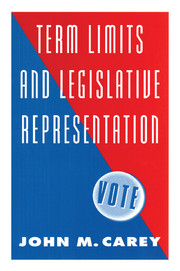Book contents
- Frontmatter
- Contents
- List of tables and figures
- Preface
- Part I Term limits and comparative politics
- Part II The Latin American cases
- 3 Term limits and political careers
- 4 Term limits and particularism
- 5 Term limits and legislative party cohesiveness
- Part III Term limits and the United States
- References
- Index
3 - Term limits and political careers
Published online by Cambridge University Press: 06 July 2010
- Frontmatter
- Contents
- List of tables and figures
- Preface
- Part I Term limits and comparative politics
- Part II The Latin American cases
- 3 Term limits and political careers
- 4 Term limits and particularism
- 5 Term limits and legislative party cohesiveness
- Part III Term limits and the United States
- References
- Index
Summary
Term limits on legislators alter political careers, but do not eliminate them. Chapter 2 offers some evidence of the importance of career interests in shaping Constituent Assembly decisions in Costa Rica, even despite the lack of explicit debate over the adoption of term limits in 1949. This chapter explores in detail the nature of political careers in Costa Rica and Venezuela. I argue that term limits redirect, but do not diminish, the impact that legislators' personal ambition has on political behavior.
To build a career in public office, politicians in democratic systems are dependent on at least two principals: voters and political party leaders. To some extent, assembly candidates in any system must build support among both principals to secure election. But variations in electoral rules structure the extent to which electoral success is dependent on the support of assembly constituents, or of party leaders. In the absence of term limits, the relative dependence of legislators on these two principals is determined by the strength of party leaders' control over candidates' access to ballots, whether voters cast ballots for parties or for individual candidates, whether votes cast for any member of a party are pooled across all candidates of that party in a district, and the number of seats available in each electoral district (Carey and Shugart in press).
The qualities of these four variables determine the extent to which legislators must build support among their two main principals in order to further their careers.
- Type
- Chapter
- Information
- Term Limits and Legislative Representation , pp. 71 - 102Publisher: Cambridge University PressPrint publication year: 1996



